- Home
- Michael McBride
Innocents Lost Page 6
Innocents Lost Read online
Page 6
Voices reverberated through the walls from the living room.
Preston inched closer to the window. The hamper to his left was overflowing, the arm of a sweatshirt spilling over the rim. A giant stuffed bear sat in the corner, a Brats doll on each leg. He leaned over the sill, careful not to so much as brush against it, and scrutinized it for visible prints in the accumulation of dust, but it was relatively clean and free of any significant marks. Possibly a proper dusting and black light canvassing would turn up prints or fluids of some kind.
He looked down at the ground outside the window. Small white petals were evenly scattered across the lawn, save for one spot directly in front of him, where they appeared to have been mounded.
Preston chewed on his lower lip while he thought.
The voices approached from behind and he heard footsteps in the hallway.
Preston turned and left the room. He passed Mrs. Dandridge and a uniformed officer who barely appeared out of his teens on his way to the living room, where two more uniforms had begun to unload tackle boxes filled with evidence collecting gear. Another officer was cordoning off the front yard with crime scene tape when he emerged from the front door and carefully eased along the face of the house toward the open window. The grass was matted in spots, but there were no obvious footprints. When he was within reach of the small pile of petals, he extricated his pen from his pocket and gently brushed away the uppermost petals until he uncovered a bundled swatch of fabric. He peeked from the corner of his eye at the officer, who now had his back to him as he rounded the mailbox on the street, then carefully teased the cloth out of the pile. It was worn and dirty, but the fabric was unmistakable. A black satin that iridesced with indigo when he tilted it toward the streetlight.
Tears brimmed in his eyes and his vision momentarily blurred.
It was a tattered swatch of the dress Savannah had been wearing the last time he had seen her.
And beneath it was a small plastic 16 gigabyte USB flash drive.
He set down the frayed swatch and noticed that several words had been written on it in silver fabric marker, all block letters. Something inside of him broke and a sorrow beyond anything he had ever experienced tightened around his heart.
Preston could only stare at the words.
SHE CRIED FOR HER DADDY.
VIII
Les studied the magnetometer readings. The metallic object consumed the lower strata of each of the sections they'd surveyed. He could only assume that whatever was buried down there was as large as the entire clearing, and it only stood to reason that it could have contributed to the aberrant tree growth. But what could it be? Unfortunately, the layer of metal distorted the signal of anything that might be hidden beneath it. For all he knew, it could merely be a quarter-inch thick, or it could be a solid block that extended halfway to the earth's core. What he could tell, however, was that the surface they had imaged was reasonably flat and horizontal, which excluded even the densest lode of naturally occurring ferromagnetic material. Without a doubt, the object was manmade. It obviously predated the medicine wheel built on top of it; however, it had to have been buried there long after the Native Americans who had initially constructed the wagon wheel designs had stopped making them.
He thought about the surface soil. There was no discoloration to suggest it had been turned anytime recently, other than over the small sections where the DVDs had been buried. The dirt had been solidly packed, and while he was no expert on determining the age of trees, they had definitely been growing there for quite some time. He did know that pines were notoriously slow growers, but with the way the trunks corkscrewed, it was impossible to tell how they compared in height to those in the surrounding forest if they were uncoiled. And since their growth patterns were affected by an external force, then surely the rate must have been as well. The trees weren't nearly as dense in that circular clearing, which suggested they may have once been razed to allow for the metallic object's construction.
And just like that, he was right back where he started. He couldn't figure out what could be causing the potential electromagnetic disturbance any more than he could divine the identity of the buried object.
Perhaps he was approaching this quandary from the wrong angle. Neither physics nor forestry could be counted among his strengths. Maybe since whoever had built the medicine wheel had a solid background in anthropology, the answers he sought could be found somewhere in his field of expertise. After all, whoever had sent him the photographs had gone to considerable lengths to ensure the presence of an anthropologist.
He initiated one internet search after another. The various myths surrounding the origin of the medicine wheel speculated that they were designed by the Plains Indians to commune with their Creator, perform various healing ceremonies, and conduct rituals of all kinds. He couldn't imagine how they could be used for these purposes now, so he investigated solar calendars in general, everything from Stonehenge to the Caracol Observatory in the Mayan ruins at Chichén Itzá. Their purpose was to mark celestial events, but didn't appear to have a functional component beyond that. There were twenty-eight cairns, which corresponded with the cycle of the moon. Unfortunately, he could find little correlation outside of superstition for the number as it pertained to medicine wheels. He had already searched the growth patterns of the trees, so what did that leave?
His coffee cup was now empty, but the last thing he wanted was to return to that dive. He'd felt about as welcome as the stomach flu, and he didn't like the odds that they had brewed a fresh pot since he left. Soon enough, the sun would rise, and from there it was only a matter of time before he would be free to pick up his car and head back to Laramie. Maybe he should just call it a night, grab what little sleep he could, and try to forget about this whole mess. However, he knew that turning his back on a mystery once his curiosity was aroused simply wasn't in his nature.
He was just about to take a walk in hopes that the cool night air would clear his head and provide some inspiration when he realized there was one angle he hadn't carefully considered. The bodies. Until that moment, he had thought of them as separate from the medicine wheel itself, a macabre symptom of a diseased mind. Was it possible that whoever buried them in the cairns perceived them as instrumental to its function?
Quick searches of a dozen variations of "corpses" and "medicine wheels" led him to nothing of significance. He added the criteria of "summer solstice" and "children." This time, there were some interesting matches.
He clicked the first link, and opened a page from the site of the University of Alberta's Cultural Anthropology Department. At the top, there was a picture of an ancient carving in limestone. It reminded him of many of the primitive Native American petroglyphs: two-dimensional, almost abstract renderings of stick figures. The petroglyph had been discovered on a sheer cliff near Lake Louise in Banff National Park only two years ago, and had yet to be attributed to a specific tribe, especially considering how many had lived in the dense pine forests and steep mountainous valleys over the course of the last ten thousand years. The author of the short article beneath the image suspected it had been carved by either the Blackfoot or the Shoshone, who were credited for many of the petroglyphs across the province.
The etching depicted the sun at the top, roughly twenty-five degrees to the right of the center of the design. The earth was represented by a straight line with a gap in the middle. There were small stick figures to either side of the break in the horizontal line, beneath which was a square pit. A larger stick figure stood at the bottom, and above his head, wavy lines connected him to a larger stick figure still, which hovered between the level of the ground and the sun. Dozens of spirals had been carved under the diminutive stick figures, all of them counterclockwise, a traditional motif among indigenous tribes, who often carved them along particularly treacherous trails or at the entrance to perilous canyons. It was the sign for danger. And coincidentally, it just happened to match the spiral orientation of the strange trees. Ther
e were several more smaller spirals in the sky amid a scattering of stars. The entire design was enclosed inside a circle with dots along its circumference like the outer ring of a medicine wheel.
Les skimmed the article. It was all speculation without any substantiated fact. The author, a graduate student named Patricia Christensen, suspected the petroglyph represented a ritual that corresponded to the summer solstice, as evidenced by the angle of the sun to the horizon, twenty-six degrees to match that of the celestial orb, which reached its northernmost position relative to the earth over the Tropic of Cancer on that day. The stars were supposedly Aldebaran, Fomalhaut, Rigel, and Sirius, among others. But there was no mention of the possible significance of the smaller stick figures, whose size suggested they might be children, nor of the odd relationship between the man in the pit and the other in the sky.
He clicked through a few more sites, which were all variations upon the same theme. While the order of the words changed, their substance and the picture never did.
Les rubbed his weary eyes and glanced toward the curtains. The night had brightened considerably, but the sun had yet to breach the eastern horizon on this summer solstice. Who knew what this, the longest day of the year, would bring? All he knew with any kind of certainty was that whoever had built the medicine wheel and summoned him all the way out here into the Wind River Range had meant to mark this one day, but for what reason?
He again looked at his laptop and gasped.
The layer of ferromagnetic material under the ground.
The larger stick figure in the pit on the petroglyph.
Fumbling the business card the deputy had given him from his wallet, he reached for the phone.
Jesus.
He suddenly realized why he'd been drawn into this mess.
He knew how to find the killer.
Chapter Three
I
22 Miles West of Lander, Wyoming
Deputy Sean Miller walked to the western edge of the clearing. He heard what sounded like a distant scream echo off into the darkened valley. His mind was playing tricks on him now. The more he rehearsed the sound in his head, the more certain he became that it had just been the cry of a circling hawk. This crime scene was really starting to get to him. All of the death and the hideous manner in which the bodies had been staged was like something out of his worst nightmares. This definitely wasn’t what he’d signed on for. He needed to get away from the carnage, if only for a few minutes. Just take a quick break to get some fresh air and calm his nerves. He was already starting to feel as though the children they disinterred one by one were somehow watching him from the corners of their vacant eyes.
He glanced over his shoulder to confirm that the others were still occupied by their various tasks, then ducked off into the forest. Once he was far enough away that he could no longer smell the worsening stench of decomposition, he stood on top of a rocky ledge and stared down into the canyon. The sky had begun to lighten by degrees overhead. A thin stream meandered through the dense pines far below. Rugged granite outcroppings formed steep walls on the opposite side, beyond which sharp mountain peaks serrated the western horizon. He plucked a Doral from his pack and lit it, allowing the smoke to momentarily cleanse him and take the edge off his nerves.
The sheriff had run off without explanation nearly two hours ago now and still hadn’t passed along word of his whereabouts to them. For all they knew, Dandridge had cracked up and abandoned them. He knew Keith better than that, though. They’d worked together for nearly three years now. His sudden disappearance was totally out of character. Something must have happened elsewhere in the county that required the sheriff’s immediate attention, although Miller couldn’t imagine anything more pressing than their current situation. Had Keith mentioned something about waking up his wife to check on their daughter? Was something wrong with Maggie? For now he could only guess. The sheriff had taken the satellite phone, effectively cutting them off from the outside world. They were well outside of cell phone range, and this high in the mountains their walkie-talkies were useless. Maybe he could use that as an excuse to hoof it back down to his cruiser to check in with dispatch.
He drew the last drag from his cigarette, crushed the cherry under his heel, and launched the butt out over the nothingness.
The prospect of returning to the ring of corpses made him physically ill, but the sooner this was all over, the better. He was going to do whatever it took to get back to his normal life and a nice hot shower if he had to bag every last one of those festering skeletons and carry them down the mountain himself. Whatever it took to get him out of this damn forest, which had begun to feel as though it was sucking the very life out of him.
Miller started back toward the clearing. It announced its proximity to his olfactory senses first. Dear God, was it possible that the smell had grown even worse in the few minutes he’d been gone? He heard the clatter of stones being cast aside from the cairns and muffled voices from directly ahead, and unconsciously slowed his pace. Surely at some point in the coming morning another deputy would be dispatched to spell him, if only long enough to get a few hours of sleep. It was a good thing news of their discovery hadn’t leaked. Lord only knew what kind of hell might break loose if the mice learned that all of the cats were away.
He was nearly to the clearing when he caught a glimpse of blue from the corner of his eye. Around the thick trunk of a ponderosa pine, he could barely see the shoulder and hip of one of the uniformed officers. Hank Wilcox was squatting with his back against the tree.
Miller chuckled.
“Hey, Wilcox. What are you doing back there? Taking a dump?”
He waited for a response that never came. Not even a grunt. And Wilcox made no effort to maneuver himself out of sight.
“Come on. You know I’m just giving you shit. Or do you have plenty of that back there already?”
Miller shoved through a stand of scrub oak and rounded the trunk. Wilcox leaned against the bark, legs tucked against his chest, forehead resting on his knees. Was that shifty little bastard trying to sneak a catnap?
“Give me a break, man. If I have to stay awake and rummage through corpses, then so do…” His voice petered to a whisper. “Holy crap.”
Wilcox’s slacks were splotched with black stains and his face was smeared with what Miller at first assumed was mud. He tipped up Wilcox’s chin. Vacuous brown eyes stared through him. A gaping laceration crossed the officer’s throat, from which a steady trickle of blood flowed.
“Jesus,” Miller gasped, dropping Wilcox’s head back against his knees.
Miller’s heart raced. He drew his pistol with trembling hands and sighted the forest down the barrel. The killer was out there somewhere at this very moment. His first instinct was to shout for help, but the last thing he wanted was to draw attention to himself and betray his location. The killer already had every other advantage.
He walked slowly back to the path, careful not to make even a single twig snap underfoot. A gentle breeze shivered through the canopy and rustled the detritus. Several more stones clattered before the sounds ceased altogether.
Silence washed over the forest.
Miller crept forward, arms extended, sweeping his pistol from side to side. A gateway of twisted pines welcomed him into the clearing. Everything was still. The rotten remains of children knelt at the perimeter, some amid the piles of rocks hauled away from the cairns, others still entombed. His skin crawled beneath the weight of unseen eyes. He couldn’t shake the feeling that the small skulls turned imperceptibly to watch him pass.
He surveyed the area. The cases of evidence-collecting gear lay on the ground, their contents spilled across the dirt beside a broken laptop. One of the cairns to the north was arrested in a state of partial deconstruction. Only the cranium and a portion of the right shoulder were visible through the gap. A cloud of dust settled over a patch of disturbed pine needles. All of the others were gone, simply vanished.
Again, he resisted t
he urge to call out and eased silently toward the jumble of gear. It wasn’t until he was nearly right on top of it that he saw the amoeboid patches of mud surrounding the cairn. Arcs of dark fluid crisscrossed the mound of stones and drew lines across the earth.
Panic seized him. The others had been slaughtered right here, and they hadn’t seen it coming. He hadn’t heard a single gunshot, which would have reverberated through the mountains like a peal of thunder. There were no signs of a struggle, other than the scuff marks in the dirt and—
Smooth trails led into the forest behind the cairn, thick with mud and lined with the disturbed detritus. Something had been dragged off into the underbrush. Something that was still bleeding.
He pointed his Beretta Px4 Storm at the wall of pines, aspens, and the scrub oak between their coiled trunks, and advanced slowly. His pulse thumped in his ears so hard and fast it caused his vision to tremble, lending movement to the leaves and branches, and the shadows lurking beneath them. Every instinct cried out for him to turn around and run as fast as he could in the opposite direction, but none of these men, these trained law enforcement officers, had been given enough warning of the impending attack to fire off a round in their defense, let alone raise a cry for help. If he ran, he would be sacrificing the small measure of power he maintained with the pistol.
At the edge of the forest, he shouldered aside the branches that obstructed the course of the bloody trail and gasped in shock. A haphazard mound of bodies had been heaped on a mat of dead leaves, a tangle of arms and legs that smelled of freshly butchered meat. Vacant eyes. Startled expressions. Torn clothing. And more blood than he had ever seen before.

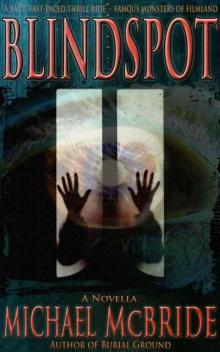 Blindspot
Blindspot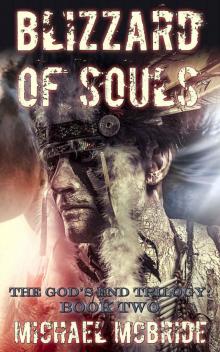 Blizzard of Souls
Blizzard of Souls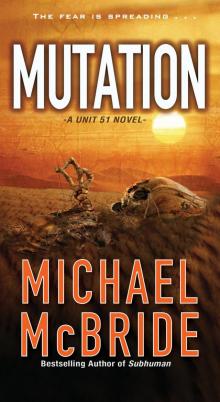 Mutation
Mutation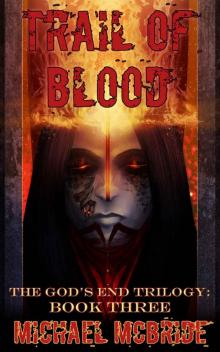 Trail of Blood
Trail of Blood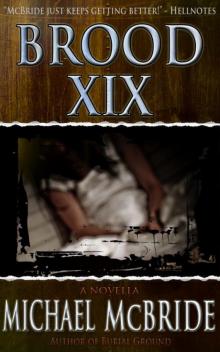 Brood XIX
Brood XIX The Fall
The Fall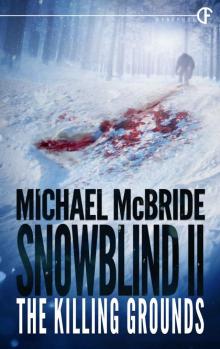 Snowblind II: The Killing Grounds
Snowblind II: The Killing Grounds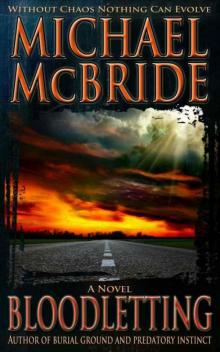 Bloodletting
Bloodletting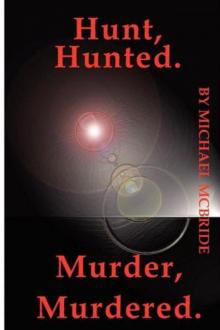 Hunt Hunted, Murder Murdered
Hunt Hunted, Murder Murdered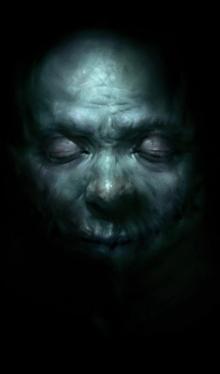 The Bloodspawn
The Bloodspawn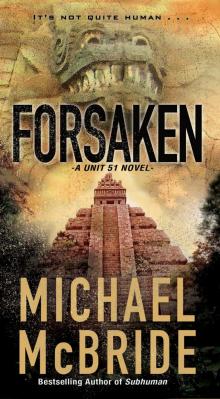 Forsaken
Forsaken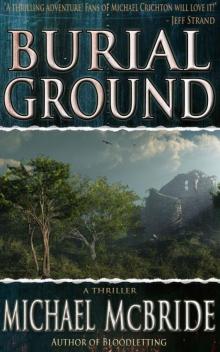 Burial Ground
Burial Ground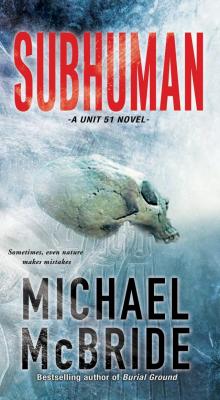 Subhuman
Subhuman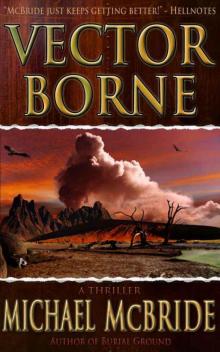 Vector Borne
Vector Borne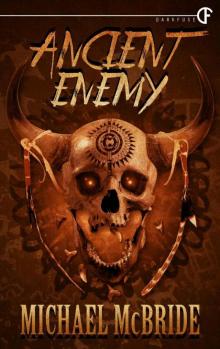 Ancient Enemy
Ancient Enemy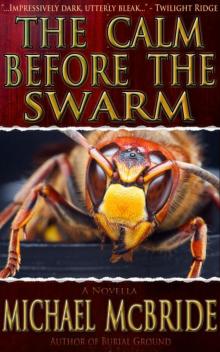 The Calm Before The Swarm
The Calm Before The Swarm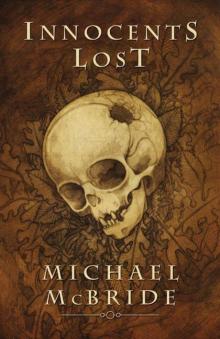 Innocents Lost
Innocents Lost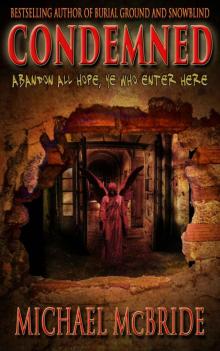 Condemned: A Thriller
Condemned: A Thriller